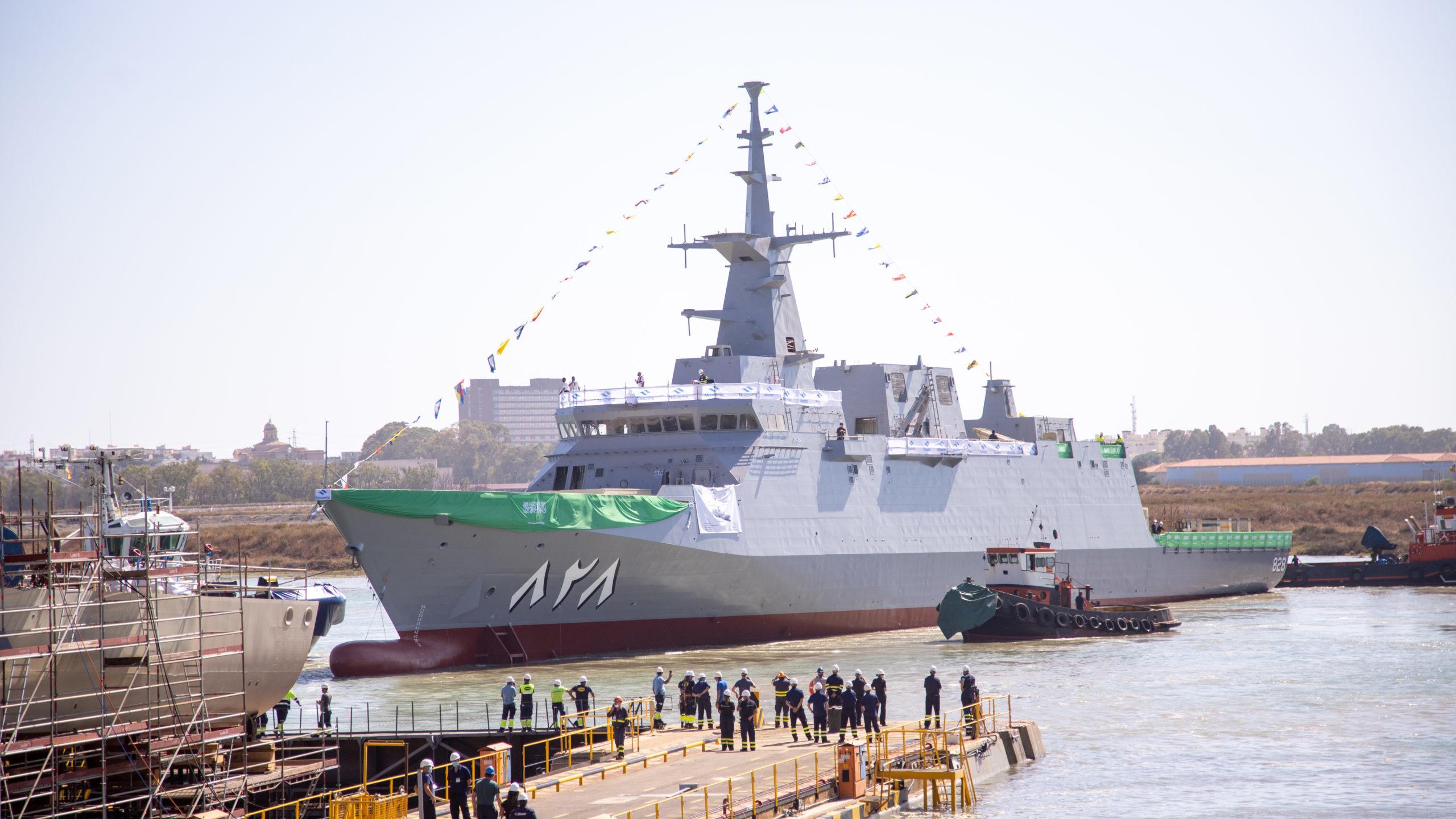Spanish Gov’t Company To Build Ships in Saudi Arabia for Saudi Navy
The deal aims to fully localize shipbuilding in the kingdom in accordance with Vision 2030’s goal of establishing localized Saudi defense industries
The Saudi Defense Ministry signed a memorandum of understanding (MoU) with a Spanish state-owned company to build multi-mission combat ships for its navy, the state-run Saudi Press Agency reported on Thursday. Navantia, the company with which Riyadh signed the deal, agreed to locate 100% of its operations to build the fleet in Saudi territory.
Navantia has built ships for the Royal Saudi Naval Forces (RSNF) in the past, including five Avante 2000 corvettes. These were built at Navantia’s shipyard on the Bay of Cádiz in San Fernando, Spain.
The move is part of Vision 2030, a project developed by the kingdom’s Council of Economic and Development Affairs, chaired by Crown Prince Mohammed bin Salman. It aims to boost the country’s economic and social success through several long-term reforms.
“Vision 2030 is a holistic plan of social and economic transformation of the kingdom,” Magdalena Karolak, an associate professor of humanities and social sciences based in the UAE, told The Media Line. She said that among the priorities and goals of Vision 2030 is the establishment of localized Saudi defense industries.
According to the 85-page Saudi Vision 2030 Document, “Our aim is to localize over 50% of military equipment spending by 2030.” Karolak says this is why Navantia, which is wholly owned by Spain’s sovereign wealth fund, Sociedad Estatal de Participaciones Industriales, will build the ships in Saudi Arabia rather than in Spain or elsewhere.
Transferring the manufacturing facilities to Saudi territory will spur the creation of jobs in the country, contribute to knowledge-sharing, support additional local industries, develop the local economy, and limit spending abroad.
Rajat Ahlawat, an analyst with extensive experience in political and economic research in Europe, the Middle East, and Africa, told The Media Line that a major focus of Vision 2030 has been on the development of local technological capabilities, be they in manufacturing, IT, or upcoming technologies.
At the same time, he says that an ongoing trend in Saudi Arabia over the last few years has been to associate almost all projects undertaken by both the government and the private sector as part of Vision 2030. He describes this association as “sort of an official seal of go-ahead for the projects.”
This holiday season, give to:
Truth and understanding
The Media Line's intrepid correspondents are in Israel, Gaza, Lebanon, Syria and Pakistan providing first-person reporting.
They all said they cover it.
We see it.
We report with just one agenda: the truth.


Though the United States has long been Saudi Arabia’s major arms supplier, the kingdom chose a Spanish company for this naval project. Karolak says Madrid’s willingness to transfer operations to Saudi territory, something that Washington probably would not have allowed an American company to do, was a big part of that decision.
“The deal is not a mere buy and sale; Saudi Arabia sought a partner who would be willing to localize the operations within the kingdom. This may not have been possible with the US partners,” she says.
In addition, Karolak notes that trade between Spain and Saudi Arabia has experienced steady growth in recent years, and Spain has been named a key partner in Saudi Arabia’s transformation under Saudi Vision 2030.
Ahlawat says that, aside from Riyadh’s desire to transfer the defense industry to Saudi territory, it must also modernize its naval fleet. He notes that a large part of the RSNF’s fleet is American- and French-built vessels from the 1980s and 1990s. Many of these ships “lack modern naval technologies and are also heading toward the end of their service life,” he says.
Saudi Arabia is a regional power with over 1,400 miles of coastline positioned along two major maritime routes, the Red Sea and the Gulf, which are overseen by the RSNF, he explains. Both major waterways present security challenges for the kingdom.
These challenges are alluded to in the MoU, which says that it “aims to raise the level of readiness of the Royal Saudi Naval Forces to enhance maritime security in the region and protect the vital and strategic interests of the Kingdom of Saudi Arabia and support the strategic, operational and tactical goals of the Ministry of Defense.”
“On the country’s eastern maritime border is Iran and on its southern land border is Yemen, both of which are Saudi’s regional rivals and have the potential, directly or through proxies, to launch attacks and create instability inside the Kingdom of Saudi Arabia,” Ahlawat says.
In addition, says Karolak, piracy is a persistent problem in the Red Sea, around the Horn of Africa.
Taking all these security challenges into account, Ahlawat says, “the country needs to be well-equipped as a regional power to secure the maritime routes against any potential threat for commercial shipping.”
Lastly, he mentions prestige as another factor at play. “Any military power would be incomplete without proven modern naval combat capabilities,” he says.
Karolak says that despite choosing a Spanish shipbuilder for this purchase, Saudi Arabia remains the largest importer of American weapons in the world, purchasing an estimated $1.389 billion worth of American arms in 2021, as measured by trend-indicator value, a pricing system that expresses the volume of deliveries of major conventional weapons.
However, she adds that under the Biden Administration, the relationship between Riyadh and Washington has experienced challenges. “While the Trump Administration was very keen on boosting military trade with Saudi Arabia, the Biden Administration had to consider the fallout of the assassination of Jamal Khashoggi as well as the rising criticism of the Saudi intervention in Yemen, which prompted a reassessment of mutual relations, hence a reevaluation of the arms trade agreements signed under Trump.”
Nonetheless, Karolak points out, by November 2021 the Biden Administration had approved its first major arms deal with Saudi Arabia, followed by further agreements inked in 2022.

